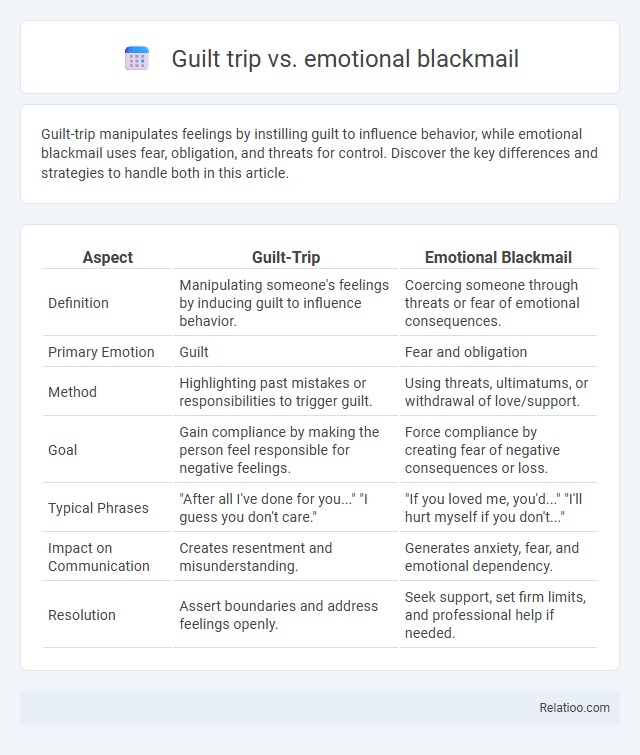Guilt-trip manipulates feelings by instilling guilt to influence behavior, while emotional blackmail uses fear, obligation, and threats for control. Discover the key differences and strategies to handle both in this article.
Table of Comparison
| Aspect | Guilt-Trip | Emotional Blackmail |
|---|---|---|
| Definition | Manipulating someone's feelings by inducing guilt to influence behavior. | Coercing someone through threats or fear of emotional consequences. |
| Primary Emotion | Guilt | Fear and obligation |
| Method | Highlighting past mistakes or responsibilities to trigger guilt. | Using threats, ultimatums, or withdrawal of love/support. |
| Goal | Gain compliance by making the person feel responsible for negative feelings. | Force compliance by creating fear of negative consequences or loss. |
| Typical Phrases | "After all I've done for you..." "I guess you don't care." | "If you loved me, you'd..." "I'll hurt myself if you don't..." |
| Impact on Communication | Creates resentment and misunderstanding. | Generates anxiety, fear, and emotional dependency. |
| Resolution | Assert boundaries and address feelings openly. | Seek support, set firm limits, and professional help if needed. |
Understanding Guilt-Trip: Definition and Examples
Guilt-trip involves making someone feel responsible for causing harm or disappointment to manipulate their behavior, often through subtle emotional cues. Emotional blackmail is a more intense form of manipulation, using threats, fear, or punishment to control your actions or decisions. Understanding guilt-trips means recognizing situations where someone exploits your sense of guilt to influence you, enabling you to respond with awareness and maintain healthy boundaries.
What Is Emotional Blackmail? Key Characteristics
Emotional blackmail is a manipulative tactic where someone uses fear, guilt, or obligation to control your behavior, often blurring boundaries and distorting reality. Key characteristics include threats (explicit or implicit), constant pressure, and exploitation of your vulnerabilities to coerce compliance. Understanding these traits helps you recognize emotional blackmail and differentiate it from a mere guilt-trip, which typically involves less manipulation and intensity.
Guilt-Trip vs Emotional Blackmail: Core Differences
Guilt-trip involves subtly inducing feelings of guilt to influence someone's behavior, often relying on implied expectations without overt threats. Emotional blackmail is a more coercive tactic using explicit threats or manipulation to control emotions and force compliance. The core difference lies in guilt-trip's indirect approach versus emotional blackmail's direct and aggressive pressure to manipulate decisions.
Common Tactics of Guilt-Tripping
Common tactics of guilt-tripping include making the target feel responsible for others' emotions, exaggerating consequences, and using past favors as leverage to induce compliance or remorse. Emotional blackmail overlaps with guilt-tripping by exploiting fears, obligations, and guilt through threats, withdrawal of affection, or punishment to control behavior. While both manipulate emotions, guilt-tripping primarily relies on inducing self-blame, whereas emotional blackmail uses broader coercive strategies to achieve compliance.
Emotional Blackmail Techniques: How They Work
Emotional blackmail techniques manipulate your feelings by using fear, obligation, and guilt to control your behavior, often causing confusion and self-doubt. These tactics involve threats, silent treatment, or withdrawal of love to create a psychological trap, making it difficult to set healthy boundaries. Understanding how emotional blackmail operates helps you recognize the patterns and protect your emotional well-being effectively.
Psychological Impact of Guilt-Trip
Guilt-trip and emotional blackmail both manipulate emotions, but guilt-trips specifically induce feelings of shame and responsibility to control behavior, often leading to anxiety, low self-esteem, and chronic self-doubt. The psychological impact of guilt-trips includes heightened stress levels and impaired decision-making as individuals internalize blame and experience ongoing emotional distress. Unlike overt emotional blackmail, guilt-trips subtly erode mental well-being by creating a persistent sense of personal failure and undeserved guilt.
Emotional Consequences of Blackmail
Emotional blackmail exerts intense psychological pressure by instilling fear, obligation, and guilt, often leading to anxiety, decreased self-esteem, and emotional exhaustion. Unlike a simple guilt-trip, blackmail manipulates emotions through threats or coercion, creating a toxic dynamic that erodes trust and autonomy. The emotional consequences frequently manifest as chronic stress, depression, and a pervasive sense of powerlessness.
Recognizing the Signs in Relationships
Recognizing the signs of guilt-trip, emotional blackmail, and manipulation in relationships involves identifying patterns of coercion where one partner exploits emotions to control the other. Guilt-tripping often triggers feelings of shame or obligation to influence behavior, while emotional blackmail includes threats, fear, or punishment to enforce compliance. Awareness of these tactics enables individuals to set healthy boundaries and maintain emotional well-being.
Setting Healthy Boundaries Against Manipulation
Understanding the distinctions between guilt-trip and emotional blackmail is crucial for setting healthy boundaries against manipulation. Guilt-tripping involves inducing a sense of responsibility or remorse to influence your behavior, while emotional blackmail leverages fear, obligation, or guilt to coerce compliance. Establishing clear, assertive communication helps you recognize these tactics and protect your emotional well-being from manipulation.
Effective Strategies to Respond and Recover
Effective strategies to respond to guilt-trips involve recognizing manipulation tactics, setting clear boundaries, and calmly asserting personal values to maintain emotional autonomy. Emotional blackmail requires identifying threats disguised as concern, refusing to comply with unreasonable demands, and seeking support from trusted individuals or professionals for accountability and recovery. Recovery from these forms of emotional manipulation centers on rebuilding self-esteem through therapy, developing assertiveness skills, and fostering healthy communication patterns to prevent recurrence.

Infographic: Guilt-trip vs Emotional Blackmail
 relatioo.com
relatioo.com